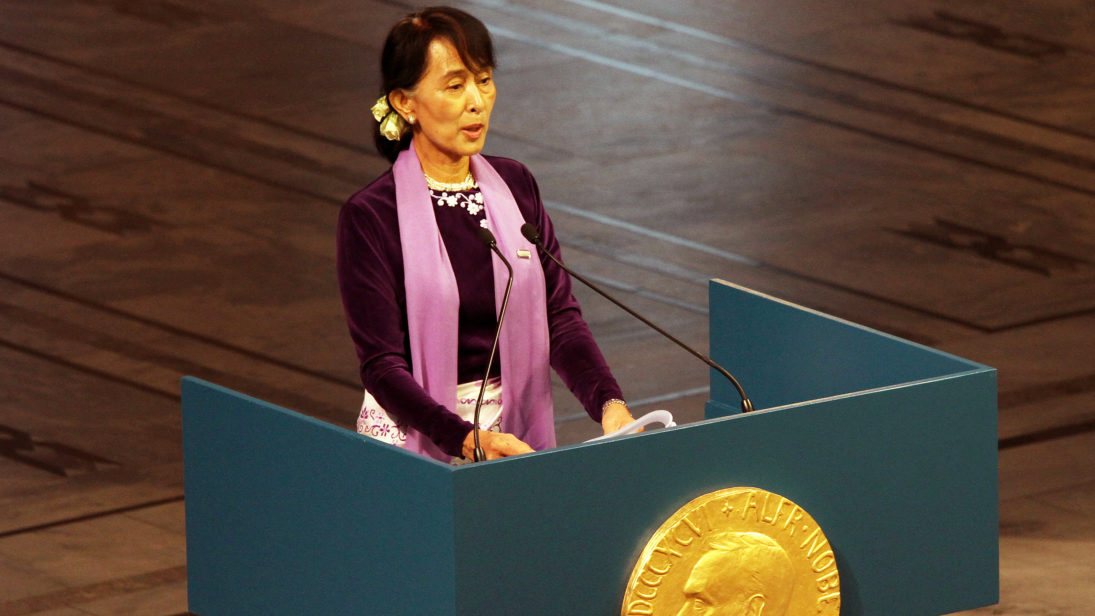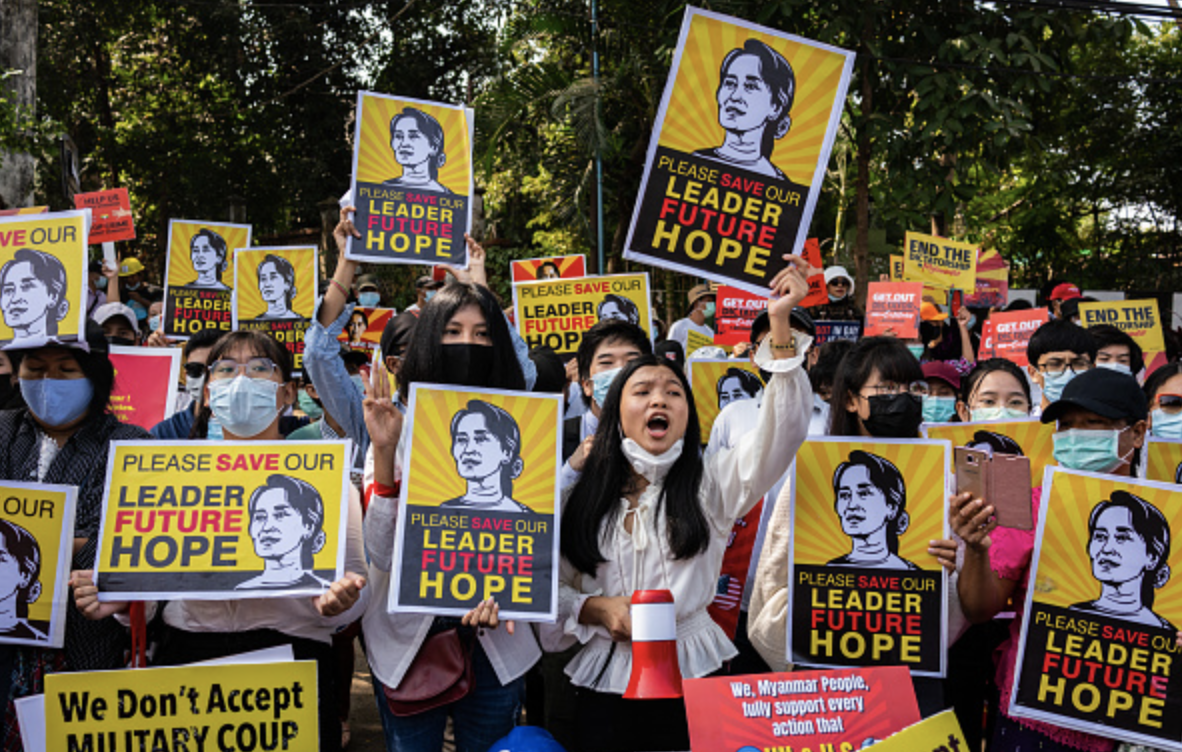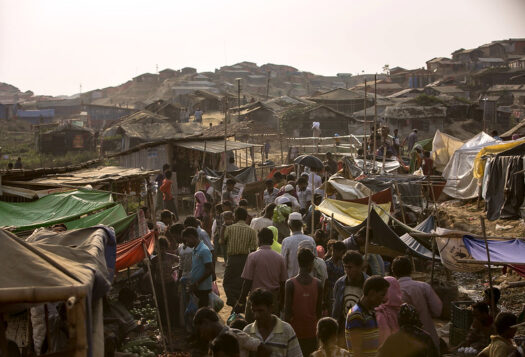
On February 1, 2021, the Myanmar military led by Senior General Min Aung Hlaing arrested and detained State Counsellor Aung San Suu Kyi along with several senior civilian leaders from the National League for Democracy (NLD), in what has been called an unconstitutional and illegal coup. The situation in Myanmar is rapidly evolving, with peaceful protests organized across major cities in the country. So far, the police force has exercised restraint, although a young female protestor was fatally shot in the capital, Naypyitaw, on February 9. The United States has announced sanctions on military leaders and USAID has announced that it will redirect USD $42.4 million worth of official development assistance away from supporting the government and towards strengthening civil society. Although targeted sanctions are not expected to dramatically shift the balance of power in country, they do signal a diplomatic commitment to subvert the military’s efforts to consolidate its power on the pretext of election fraud. However, New Zealand remains the only country that has taken measures to distance itself from the military government, announcing the suspension of ties with high-level military and political contacts in Myanmar. In contrast, Myanmar’s neighbors, including China, Bangladesh, and India, appear to be treading carefully given the myriad of geostrategic and economic exigencies each country faces as it begins to recalibrate its relationship with Myanmar in light of recent political developments.
In contrast, Myanmar’s neighbors including China, Bangladesh, and India appear to be treading carefully given the myriad of geostrategic and economic exigencies each country faces as it begins to recalibrate its relationship with Myanmar in light of recent political developments.
Balancing Strategic Interests: Neighborhood Reactions
The response from Myanmar’s immediate neighborhood has been far more subdued. While China’s Xinhua News Agency called the coup a “major cabinet reshuffle,” India released a statement expressing “deep concern” over the situation, and reiterated its commitment to the democratic transition in Myanmar. It is worth noting that Myanmar’s geostrategic location in South Asia has always been regarded as important for both India and China – a critical buffer-zone with vast natural resources that China has sought to gain access to in recent years. China also remains Myanmar’s largest trading partner.
Meanwhile, India also has a history of strategic cooperation with the Tatmadaw, particularly on counterinsurgency and border security along India’s northeastern border. The two countries conducted a joint operation to eliminate militant camps operating in Manipur, Nagaland, and Assam in May 2019, and in October 2020 the Foreign Secretary of India, Harsh Vardhan Shringla, visited Myanmar with India’s Chief of Army Staff to further strengthen security ties with Myanmar. Given that both India and China have a significant stake in Myanmar’s political fortunes, it should not be surprising that neither side wants to exert pressure on the newly formed military government, at least publicly, perhaps preferring to work with this new reality instead.
Bangladesh, on its part, has made it clear that their most urgent concern is the repatriation of the nearly one million Rohingya refugees in the country. In a recent report, Bangladesh’s foreign minister AK Abdul Momen clarified that the agreement made with Myanmar will be followed; indeed, it appears Bangladesh is counting on the decades of diplomatic relations it has sustained with the Tatmadaw to ensure Myanmar continues to honor its commitments. In the same report, Bangladesh also reaffirmed its “hope for the democratic process and constitutional arrangements” in Myanmar, indicating that while the current situation is not ideal, Bangladesh’s primary focus remains on ensuring safe and voluntary repatriation of refugees and increasing cooperation on security along its own border with Myanmar.

Notably, Myanmar’s renewed engagement with Thailand’s military-led government could also have implications for its relations with countries in the neighborhood. Recent reports suggest Sen. General Min Aung Hlaing has sought help from his Thai counterpart, Prayut Chan-o-cha, on “supporting democracy” in Myanmar. Thailand also hosts both Burmese economic migrants and a significant refugee population along its border with Myanmar, which makes continued engagement necessary for both sides. Even though Prayut has affirmed his support for the democratic process in Myanmar, it remains to be seen if the Tatmadaw is vying for Thailand’s assistance in passing a new constitution that secures a lasting hold over Myanmar’s political system.
Fears of a constitutional overhaul inspired by the Thai coup in 2014 are not unfounded given speculations from anonymous sources based in Myanmar that the Tatmadaw’s power grab was first and foremost motivated by an existential threat to the military given how poorly the Union Solidarity and Development Party, the military’s closest political proxy, performed against the NLD in both the 2015 and 2020 elections. While the new military government under the State Administration Council maintains that it took power due to concerns over election fraud, the end game appears to be much more complex. The current state of emergency was declared for a period of one year and it is entirely possible that a new civilian government will be elected in the next election promised by the military; however, Myanmar’s neighbors may be facing the possibility of maintaining the status-quo through long-term engagement with the generals whether they like it or not.
Though external observers might be disappointed by this muted response from Myanmar’s neighbors, it is important to remember that these countries face unique challenges that perhaps require a delicate balancing act to achieve their own strategic outcomes.
What Lies Ahead?
Myanmar’s neighbors know that imposing sanctions or exerting strong diplomatic pressure is counterproductive to their objectives, individually and perhaps collectively. It is clear that with U.S. sanctions in place against military leaders, China will be looking to expand its sphere of influence over Myanmar even though China indicated interest in working closely with Aung San Suu Kyi as recently as January 11 when the State Counsellor met with China’s foreign minister, Wang Yi. It is worth noting that China’s interests in Myanmar go beyond international and regional influence – there are powerful Chinese business interests involved in ensuring Myanmar remains politically stable and open for investment. Recent reports have renewed speculation that China is supporting the military in building a nationwide firewall as part of its crackdown on social media in Myanmar, which China has denied. While covert support cannot be ruled out just yet, it is clear that China will adopt a measured stance going forward and prefer to watch as the situation continues to unfold.
One can expect a similar response from India; indeed, experts have been quick to point out that India has always chosen to continue engagement despite expressing concern over Myanmar’s domestic politics. Delhi will be keen to continue security cooperation in particular, as well as continue to deliver COVID-19 vaccine doses to support Myanmar’s efforts to curb the virus. It is well acknowledged that Myanmar also plays an important role in strengthening India’s economic ties with ASEAN countries as part of the latter’s Act East Policy. Myanmar remains crucial in executing this policy through two major projects – the Kaladan Multi-Modal Transit Transport Project and the India-Myanmar-Thailand trilateral highway – both designed to encourage trade and deepen cultural connections. Against the backdrop of India’s own internal struggle with popular protests and communal unrest over the past year, prominent voices have taken to social media to highlight that India must take a moral stand against dictatorship in Myanmar. It seems unlikely that this will occur, considering India is yet to expressly acknowledge the Tatmadaw’s role in the genocide of Rohingya Muslims. India’s position in coming months might harken back to Foreign Secretary Ranjan Mathai’s statement in 2012 wherein he affirmed India’s role as a “close and friendly neighbor” even as it continues to constructively engage with “other like-minded countries” on the myriad of issues confronting Myanmar.
Much like India, it is unlikely that Bangladesh will want to jeopardize its repatriation agreement with Myanmar and may choose instead to continue private engagement with the military government while also highlighting its commitment to democracy. Though external observers might be disappointed by this muted response from Myanmar’s neighbors, it is important to remember that these countries face unique challenges that perhaps require a delicate balancing act to achieve their own strategic outcomes.
***
Image 1: Utenriksdepartementet UD via Flickr
Image 2: Hkun Lat via Getty Images


